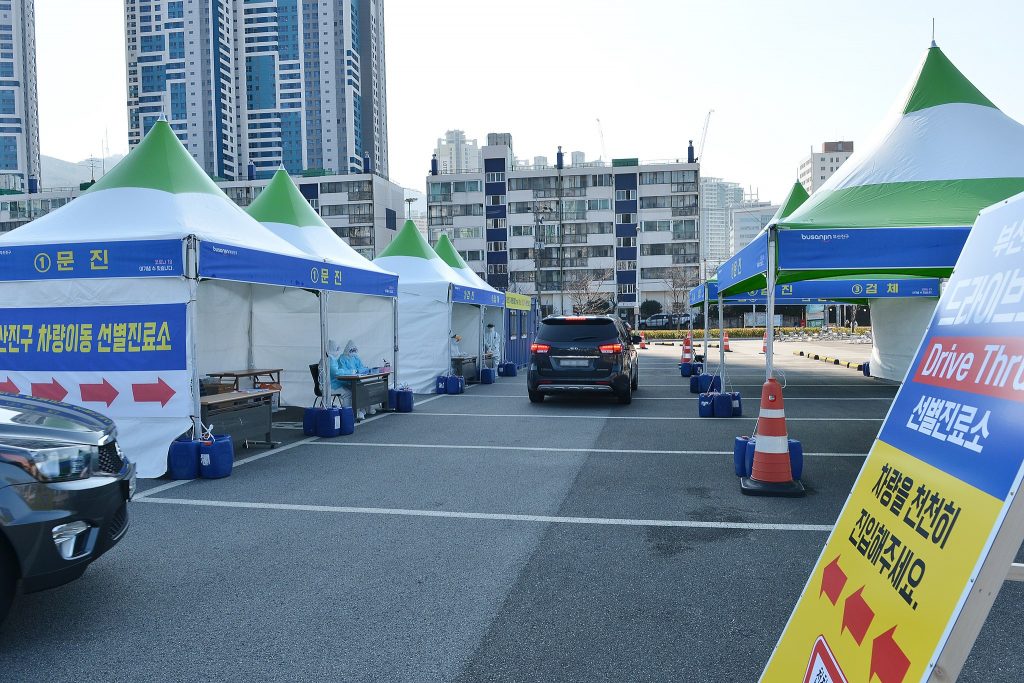South Korea’s Response to the Coronavirus: The Cost of Success
Unlike Western countries South Korea has been proactive in limiting the spread of the Corona virus without a nationwide lockdown. But how will it deal with the social and economic fallout of the measures?
While some western nations tentatively begin to ease some aspects of lockdowns, South Korea so far successfully managed the Corona crisis without such massive restrictions. Street life continues more or less normally in South Korea and most businesses including shops, restaurants and bars remain open. Only schools and childcare facilities are closed and mass events have been called off. On April 15, South Korea even held a national parliamentary election with the highest turnout in 28 years. President Moon Jae-in’s party won the ballot in a landslide, largely because his administration was credited for the successful handling of the crisis. How did South Korea achieve this remarkable success and what are the challenges ahead for the government seemingly strengthened by the electoral victory? In part, South Korea was lucky but most importantly it was well prepared institutionally and mentally due to its experience with previous crises.
Due to the very close economic relations with China and the large numbers of Chinese tourists, South Korea was one of the first countries affected. At the same time, the county has some important advantages. People entering and leaving are easily controlled in the nation, which is practically an island and has a closed border in the North. Meanwhile, South Korea’s health system is well developed, as described in the Bertelsmann Transformation Index (BTI) for 2020 that was released on April 29: “The universal health-insurance program is the most advanced element within the welfare state”. This meant that those feeling sick did not hesitate to get treatment which limited the spread of the virus and reduced undiscovered infections.
Strengthened by MERS experience
The MERS outbreak in 2015 lead South Korea to overhaul its emergency response system. Moreover, since then, everybody traveling to the country has been informed about infectious diseases and cameras at airports routinely check temperatures of arriving passengers, a measure which was in place even before the crisis. In additional, the MERS panic was still fresh in the memories of South Koreans and most started wearing masks immediately when the threat emerged. Unlike the prevailing perception in the West, mask wearing was never ordered by the government but was triggered by the public sensibility to the issue and the government’s ability for national mobilization. It helped that South Korea has a domestic mask production, producing more than 10 million a day, mostly because of the heavy air pollution during winter and spring.
When the crisis hit, the government was fast to react and build up testing capacity, including pioneering drive-through tests, and was successful in tracking paths of infections. South Korea was lucky that initial infections were concentrated in a few easily identifiable hotspots like the Shincheonj Church that could be isolated. Travel restrictions for Hubei province were also put in place early while most other travelers needed to observe 14 days of quarantine and download a self-monitoring app on their mobile phones. The movement tracing of positively tested people subsequently played an important role.
In South Korea, there have been few concerns about the privacy of tracing the movements of individuals and everybody can check the movements of all known corona patients on the internet or via apps. Names were excluded but almost all other information were posted. Warnings through apps and text messages were sent out to those who could have come in contact with those affected. In many ways, movement and contact tracing is far less intrusive than the nationwide lockdowns implemented in the West. On the other hand, lockdowns eventually end, while the data collection will most likely continue.
Protecting privacy?
So far, discussions about how to ensure privacy of personal information and prevent the misuse of information is conspicuously absent. This is worrisome because institutions to protect individual rights against the state are still underdeveloped. Formally, the South is still at war with the North and the National Security Laws limits freedom of expression and association. In this inherently repressive environment, there is always the danger that limitations of individual freedoms will be abused by an all to powerful executive. South Korea was institutionally and mentally prepared for the crisis, but my concern is that it might be less prepared for the post-Corona world.
Due to its export-dependence South Korea will be one the countries most severely hit by the crisis. Ironically, South Korea’s success in reducing infections might mean that economic effects will last even longer as it takes longer for a broader population to develop immunity. The large share of precarious workers and the underdeveloped welfare state means that the inevitable economic crisis will soon have massive social effects.
Towards an “imperial presidency”?
The election victory of President Moon’s party allows him to go back to his original promises of a more social, democratic and environmentally friendly South Korea. In particularly his plans to strengthen domestic demand through welfare policies, wage increases and strengthening labor rights seem appropriate in a time when exports will most likely collapse. At the same time, the BTI 2020 report warns of the dangers of an “imperial presidency” as presidential powers in South Korea are far reaching. Unlike the “war against the virus”, the post-Corona Korea cannot simply be built through technocratic interventions and national mobilization campaigns because the needed changes will have a redistributive effect and will thus trigger massive opposition from vested interests.
Clearly times of crises are always the times of the executive. However, shaping post-Corona South Korea will require a broad public discussion with a plurality of opinions about different policy options. Ultimately, what shapes a society are not the wars it wins but the way it makes decisions about a better future.
First published by The Fair Observer

